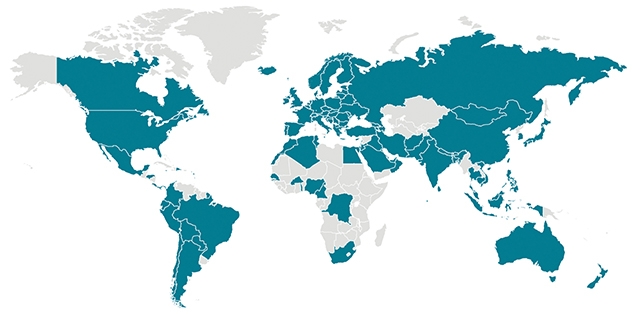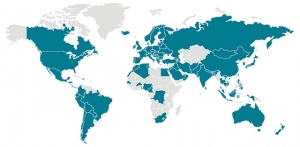Coronavirus Updates: Georgia & the World
The world faces a growing number of travel restrictions imposed by many countries, suspended games that were looked forward to, and plunging economies, all due to the continuing spread of the coronavirus, which WHO this week declared a pandemic.
China has said that the country has passed its peak of the virus, even going as far as loosening the restrictions, while Europe and America are facing the need to take stricter measures.
From Friday March 13, a ban on traveling will start functioning on foreigners traveling to the United States. President Trump imposed a 30-day ban on foreigners who have been in any of the 26 countries that make up the European Union’s Schengen Area in the previous two weeks. The limits will exempt American citizens and permanent legal residents and their families, although they could be subject to enhanced screening at the airports.
The newly-declared pandemic is disrupting numerous sporting events.
While the NBA suspended its season after a player preliminarily tested positive for coronavirus, Japan has said that there is no way to cancel the Summer Olympics.
Tokyo Governor Yuriko Koike said cancelling the summer Olympic Games was "impossible", further noting that Japan was "not thinking of changing directions nor changing plans at all".
The usually intense rugby game between the Georgians and Russians will take place in Tbilisi on March 14 without any cheers from an audience, as attendance is prohibited due to the fear of Covid-2019.
California has decided to ban mass gatherings of 250 people or more until the end of March in response to the coronavirus outbreak, the office of Governor Gavin Newsom said.
The country of Georgia might have to take the same measures, Paata Imnadze, Deputy Head of the Georgian National Disease Control Center, said on Thursday morning. The move is not planned yet, but Imnadze noted that “we don’t want to reach the state that was reached by other countries and then take this measure”. The ban might include gatherings like weddings and funerals.
However, bans have already affected the educational sector in Georgia, with schools, colleges and kindergartens closing for disinfection on March 4, one week prior to the planned spring break. The preventive vacation was supposed to last until March 16, but on Wednesday, the off-time from educational institutions was extended to April 1. The decision was made by the Inter-Agency Council against Coronavirus.
Some colleges, like the Free University of Tbilisi, have said they will continue the semester online, with more details to come.
The latest coronavirus statistics in the world claim that there are a total of 126, 621 cases around the globe; 4,638 deaths from the virus; and recoveries of 68,322.
The latest reports from the Georgian government say that Georgia has a total of 24 cases of coronavirus confirmed in the country.
On March 10, eight new cases were taken into account, one of them a girl of 12 years old- a family member of the fourth confirmed case who returned from a vacation in Italy late February.
On March 11, another new case was confirmed. The information was published on the website stopcov.ge, specially created by the local government to monitor the spread of the virus in the country.
Georgia has seen a rise in the number of quarantined people, as more and more citizens are asked to return to the country due to the state measures of citizen safety. On Thursday, 295 people were in quarantine and 49 people under supervision in hospitals in Georgia.
One of the confirmed coronavirus cases is that of Deputy Minister of Environmental Protection and Agriculture of Georgia Iuri Nozadze, who tested positive for Covid-2019 on Tuesday.
The Ministry has assured society that there was no threat of the virus spreading from him to his employees.
It was then revealed on March 12 that the Assistant to the Health Minister of Georgia Ekaterine Tikaradze, whose spouse has tested positive for the new coronavirus, is in self-isolation.
The Minister said after the Cabinet meeting on Thursday that her assistant has tested negative for the coronavirus, however, she has chosen to remain in self-isolation.
“My assistant has tested negative for the coronavirus but has been in self-isolation for one week, as a preventive measure,” Tikaradze said.
On March 11, Turkey was the last of Georgia’s land neighbors to confirm the first coronavirus case. A day later, Georgia’s government announced their decision to set entry restrictions for incoming foreigners.
Entry restrictions at the Georgian border will be imposed for citizens arriving from German, France, Austria, and Spain, Georgian Prime Minister Giorgi Gakharia said at the government meeting on Thursday morning.
All Georgian nationals returning from these countries will undergo a 14-day quarantine regime, and foreign nationals must provide a PCR certificate proving they are free from coronavirus at the border or undergo a quarantine regime.
“The regime of crossing the Georgian border is tightening both for local and foreign citizens. We have already imposed some restrictions for citizens returning from China, South Korea and Italy, this regime will also apply to citizens arriving from Germany, France, Austria and Spain, which means that all Georgian citizens returning to their home country will undergo a 14-day quarantine regime while foreign citizens will have to submit a PCR certificate of coronavirus, otherwise they will undergo the 14-day quarantine,” the Prime Minister said.
He added that each citizen of Georgia is recommended to refrain from traveling to foreign countries for several months.
“This is a very important recommendation and we hope that our citizens will take this recommendation into account,” the head of the government said.
While demanding PCR certificates from foreign nationals when entering the country seems reasonable, there are some factors that need to be considered. Some countries, like the UK, can find patients waiting weeks to get a PCR certificate, as thousands are being tested each day for the new coronavirus. On Wednesday, the British media outlet The Guardian wrote that “To avoid overwhelming limited testing facilities, the National Health Service (NHS) said it would test only people with a “high chance” of having the illness, meaning people who had had close contact with a confirmed case or who had recently gone to a high-risk country”, while The Sun wrote that “the NHS is planning to ‘ramp up’ testing facilities in the coming weeks so that 10,000 coronavirus tests can be performed each day. It’s also been promised that in most cases patients will be informed whether they’re infected or not the same day.” As such, any Brits planning to come to Georgia may end up facing quarantine on arrival if Georgia expands its list of restricted countries before the NHS gets a handle on the testing.
On Thursday morning, the Georgian Prime Minister assessed the country’s standing on preventive measures, and noted that all relevant agencies will work in emergency mode to help deal with the virus outbreak.
"Considering the unfortunate statistics from all over the world, we can say that we are doing well coping with the challenges related to COVID-19, however, we have no reason to relax or be satisfied as yet," PM Gakharia said.
“These challenges will increase daily and we are obliged to be appropriately prepared to respond to them. Primarily, we should take care of our elderly, children and each other, of course. Every government agency is moving to a 24/7 work schedule in the given emergency conditions. It particularly applies to the Ministries of Health, Interior, Education and Justice, along with those of Foreign Affairs and Finance through subsidiaries of the latter that operate at the border of the country,” he noted.
Soothing the unceasing concern over the coronavirus pandemic, The Guardian wrote on Wednesday evening that a newly-created remedy has helped a US patient recover from the disease.
Hopes are rising over the experimental drug's effectiveness against coronavirus, as it has shown a positive outcome on a 35-year-old man in Washington; however, full trials are needed to prove the effectiveness of the drug. This will be coming in the next few weeks.
By Nini Dakhundaridze












